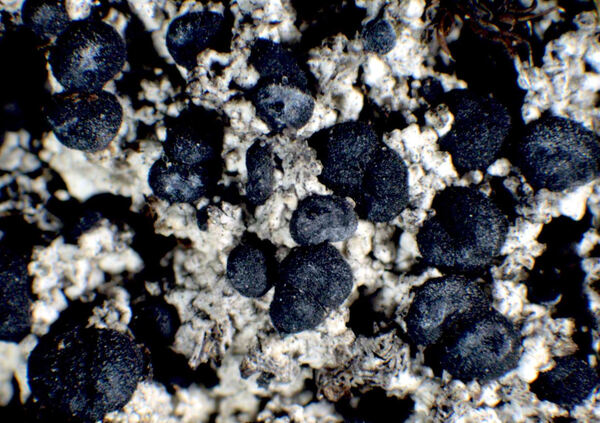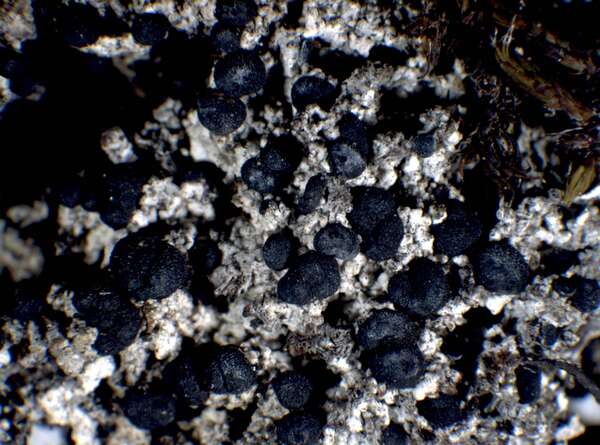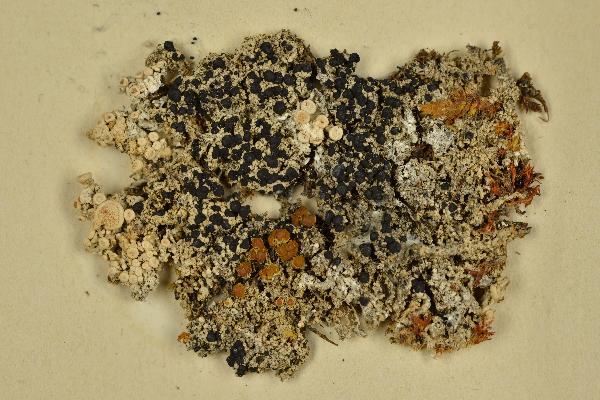Tetramelas geophilus (Sommerf.) Norman
Nytt Mag. Naturvid., 7: 236, 1853. Basionym: Lecidea geophila Flörke ex Sommerf. - Suppl. Fl. Lappon.: 157, 1826.
Synonyms: Buellia geophila (Sommerf.) Lynge; Buellia insignis var. muscorum (Hepp) Körb.; Buellia triphragmia (Nyl.) Arnold non auct.; Diplotomma geophilum (Sommerf.) S.R. Singh & D.D. Awasthi; Lecidea triphragmia Nyl. non auct.
Description: Thallus crustose, episubstratic, continuous to granulose-verrucose, white to grey-white, without a distinct prothallus. Cortex with calcium oxalate crystals: medulla white, I-. Apothecia lecideine, black, to 0.3-1.2(-1.5) mm across, immersed to sessile, with a flat to convex, rarely pruinose disc and a thin, finally often excluded proper margin. Proper exciple brown-black throughout, with rounded, thin-walled cells, the pigment giving a K+ yellow solution; epithecium brown, N-; hymenium colourless, not inspersed with oil droplets, 70-85(-100) µm high, I+ blue; paraphyses branched in upper part, the apical cell swollen, 4-5 µm wide, with a brown cap; hypothecium brown-black. Asci 8-spored, clavate to cylindrical-clavate, the apical dome K/I+ dark blue with a pale, conical-pointed apical cushion (axial mass), the wall I-, but the thin outer gel I+ blue, Bacidia-type. Ascospores 3-septate, dark brown, often curved, narrowly ellipsoid, (20-)24-38(-43) x 6-13 µm, the wall uniformly thick, indistinctly rugulate. Pycnidia rare, black, immersed in thallus. Conidia bacilliform, 4-6 x c. 1 µm. Photobiont chlorococcoid. Spot tests: thallus K- or K+ indistinctly yellow, C-, but C+ intensely yellow under the dissecting microscope, KC+ yellow to orange-yellow, P-, UV+ orange. Chemistry: 6-O-methylarthothelin.
Growth form: Crustose
Substrata: soil, terricolous mosses, and plant debris
Photobiont: green algae other than Trentepohlia
Reproductive strategy: mainly sexual
Commonnes-rarity: (info)
Alpine belt: rare
Subalpine belt: very rare
Montane belt: absent
Dry submediterranean belt: absent
Humid submediterranean belt: absent
Padanian area: absent
pH of the substrata:
1 2 3 4 5
Solar irradiation:
1 2 3 4 5
Aridity:
1 2 3 4 5
Eutrophication:
1 2 3 4 5
Poleotolerance:
0 1 2 3
Altitudinal distribution:
1 2 3 4 5 6
Rarity
absent
extremely rare
very rare
rare
rather rare
rather common
common
very common
extremely common
Loading data...
Occurrence data
Predictive map
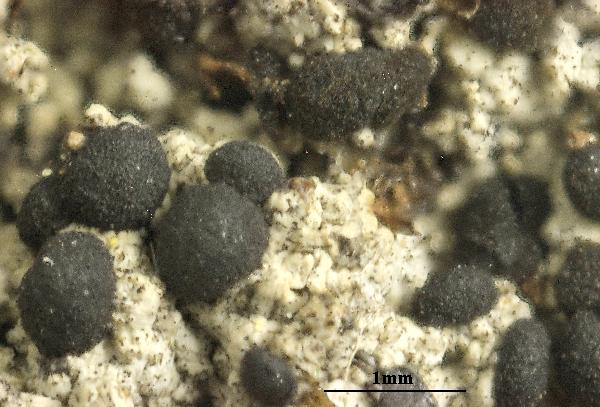
Felix Schumm - CC BY-SA 4.0
[VZ2287], Austria. Tirolia, alpes "Hohe Tauern" dicti, Gruben, secus
viam inter Stein et casas alpinas "Sudetendeutsche Hütte" dictas, 1800
m. Ad saxa schistosa, supra muscos emortuos. Leg. J. Horáková et. A.
Vezda. EX A. VEZDA: LICHENES SELECTI EXSICCATI NR. 2287 as Buellia geophila
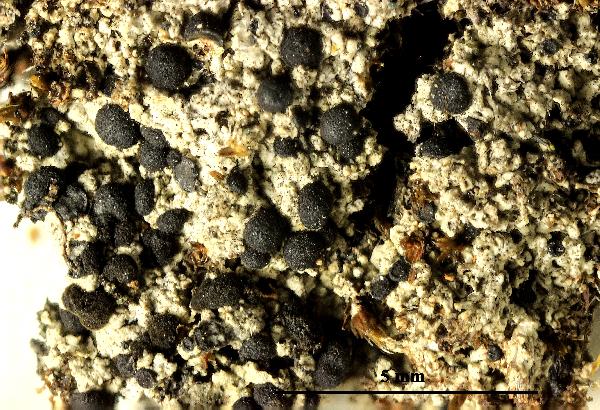
Felix Schumm - CC BY-SA 4.0
[VZ2287], Austria. Tirolia, alpes "Hohe Tauern" dicti, Gruben, secus
viam inter Stein et casas alpinas "Sudetendeutsche Hütte" dictas, 1800
m. Ad saxa schistosa, supra muscos emortuos. Leg. J. Horáková et. A.
Vezda. EX A. VEZDA: LICHENES SELECTI EXSICCATI NR. 2287 as Buellia geophila
Growth form: Crustose
Substrata: soil, terricolous mosses, and plant debris
Photobiont: green algae other than Trentepohlia
Reproductive strategy: mainly sexual
Commonnes-rarity: (info)
Alpine belt: rare
Subalpine belt: very rare
Montane belt: absent
Dry submediterranean belt: absent
Humid submediterranean belt: absent
Padanian area: absent
pH of the substrata:
| 1 | 2 | 3 | 4 | 5 |
Solar irradiation:
| 1 | 2 | 3 | 4 | 5 |
Aridity:
| 1 | 2 | 3 | 4 | 5 |
Eutrophication:
| 1 | 2 | 3 | 4 | 5 |
Poleotolerance:
| 0 | 1 | 2 | 3 |
Altitudinal distribution:
| 1 | 2 | 3 | 4 | 5 | 6 |
Rarity
absent
extremely rare
very rare
rare
rather rare
rather common
common
very common
extremely common
Loading data...
Occurrence data
Predictive map

Felix Schumm - CC BY-SA 4.0
[VZ2287], Austria. Tirolia, alpes "Hohe Tauern" dicti, Gruben, secus viam inter Stein et casas alpinas "Sudetendeutsche Hütte" dictas, 1800 m. Ad saxa schistosa, supra muscos emortuos. Leg. J. Horáková et. A. Vezda. EX A. VEZDA: LICHENES SELECTI EXSICCATI NR. 2287 as Buellia geophila



